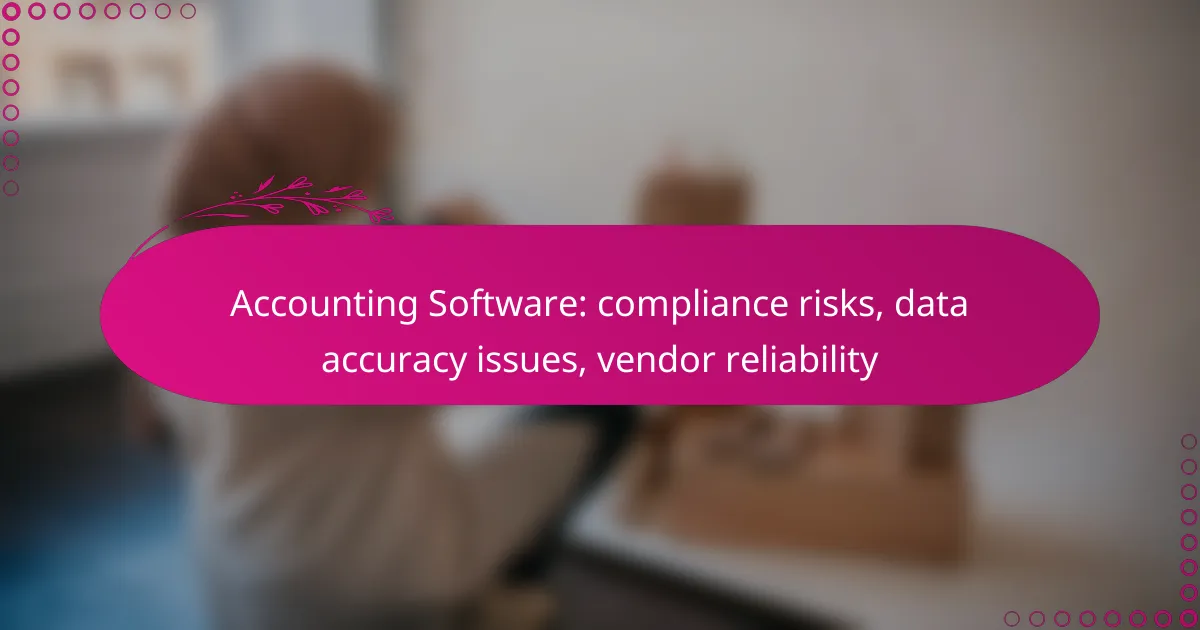In the realm of accounting software, businesses face critical compliance risks related to local regulations, data privacy, and financial reporting accuracy. Ensuring data integrity is essential, with features like automated data entry and real-time reconciliation playing a vital role in minimizing errors. Additionally, assessing vendor reliability through customer feedback and support responsiveness is crucial for maintaining compliance and data accuracy.
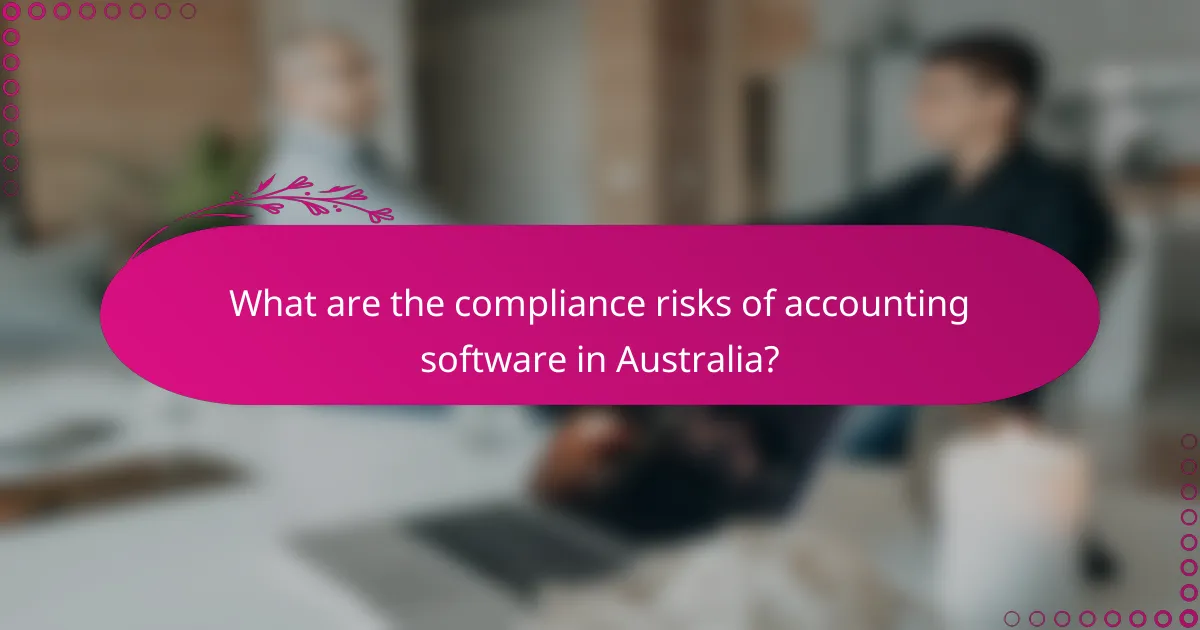
What are the compliance risks of accounting software in Australia?
The compliance risks of accounting software in Australia primarily involve adhering to local regulations, maintaining data privacy, and ensuring accurate financial reporting. Failure to manage these risks can lead to significant legal and financial repercussions for businesses.
Regulatory changes
Regulatory changes in Australia can affect accounting software compliance, as businesses must adapt to new laws and standards. For instance, updates to the Australian Accounting Standards Board (AASB) regulations may require software updates or modifications to ensure compliance.
To mitigate risks, companies should regularly review their accounting software for updates and ensure that their vendors provide timely support for regulatory changes. Establishing a compliance calendar can help track important deadlines and updates.
Data privacy violations
Data privacy violations pose a significant risk for accounting software users, especially with the Australian Privacy Principles (APPs) governing personal data handling. Companies must ensure their software complies with these principles to avoid hefty fines and reputational damage.
To protect sensitive information, businesses should implement robust security measures, such as encryption and access controls, and regularly audit their data handling practices. Choosing vendors with strong data protection policies is crucial for maintaining compliance.
Inaccurate reporting
Inaccurate reporting can lead to compliance issues, as financial statements must reflect true and fair views of a company’s financial position. Errors in accounting software can arise from incorrect data entry, software bugs, or outdated information.
To minimize inaccuracies, businesses should conduct regular reconciliations and audits of their financial data. Training staff on proper data entry techniques and investing in reliable accounting software can also help ensure accurate reporting and compliance with Australian regulations.
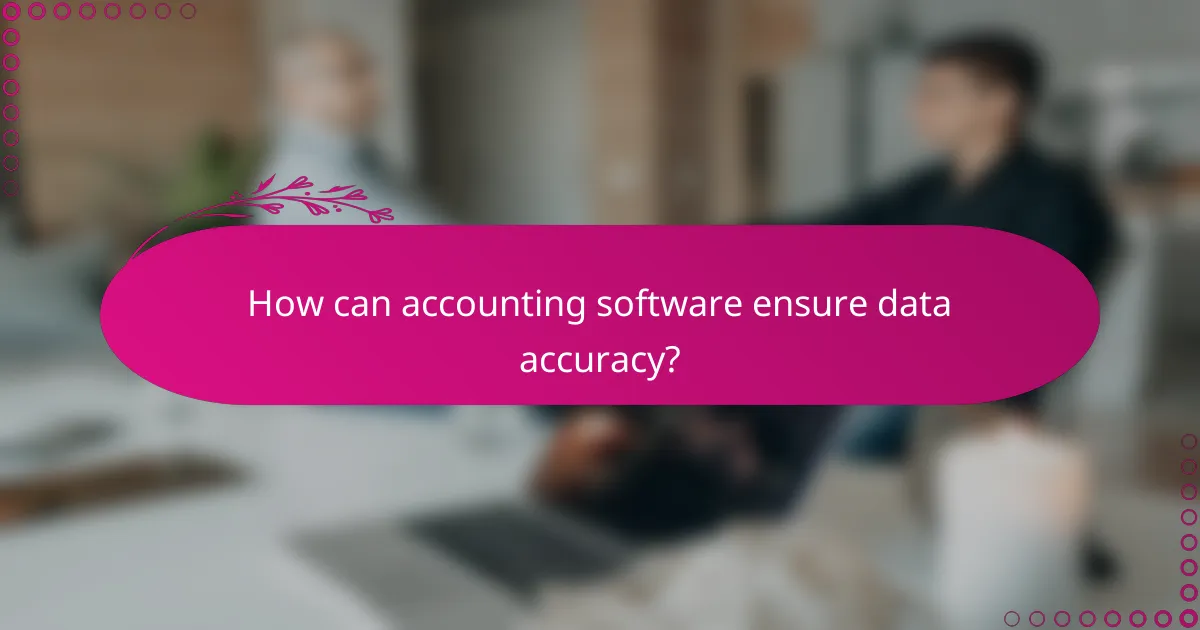
How can accounting software ensure data accuracy?
Accounting software can ensure data accuracy through features like automated data entry, real-time reconciliation, and audit trails. These functionalities help minimize human error, maintain up-to-date records, and provide a clear history of transactions.
Automated data entry
Automated data entry reduces the risk of human error by using technology to input data directly from source documents or other systems. This process can significantly speed up data collection and improve accuracy, as it eliminates manual typing mistakes.
For example, Optical Character Recognition (OCR) technology can scan invoices and automatically input relevant data into the accounting system. This can save time and ensure that the information is consistent and reliable.
Real-time reconciliation
Real-time reconciliation allows businesses to continuously compare their financial records with bank statements and other financial data. This immediate feedback helps identify discrepancies quickly, enabling timely corrections and reducing the risk of errors accumulating over time.
Many accounting software solutions offer integration with banks and payment processors, allowing for automatic updates. This feature can help businesses maintain accurate cash flow records and ensure that their financial statements reflect the current state of their accounts.
Audit trails
Audit trails provide a detailed record of all transactions and changes made within the accounting software. This transparency is crucial for ensuring data accuracy, as it allows users to track who made changes, when they were made, and what the original data was.
Having a robust audit trail can also assist in compliance with regulations, as it provides evidence of financial activities. Businesses should regularly review these trails to identify any unusual activity or errors that may need addressing.
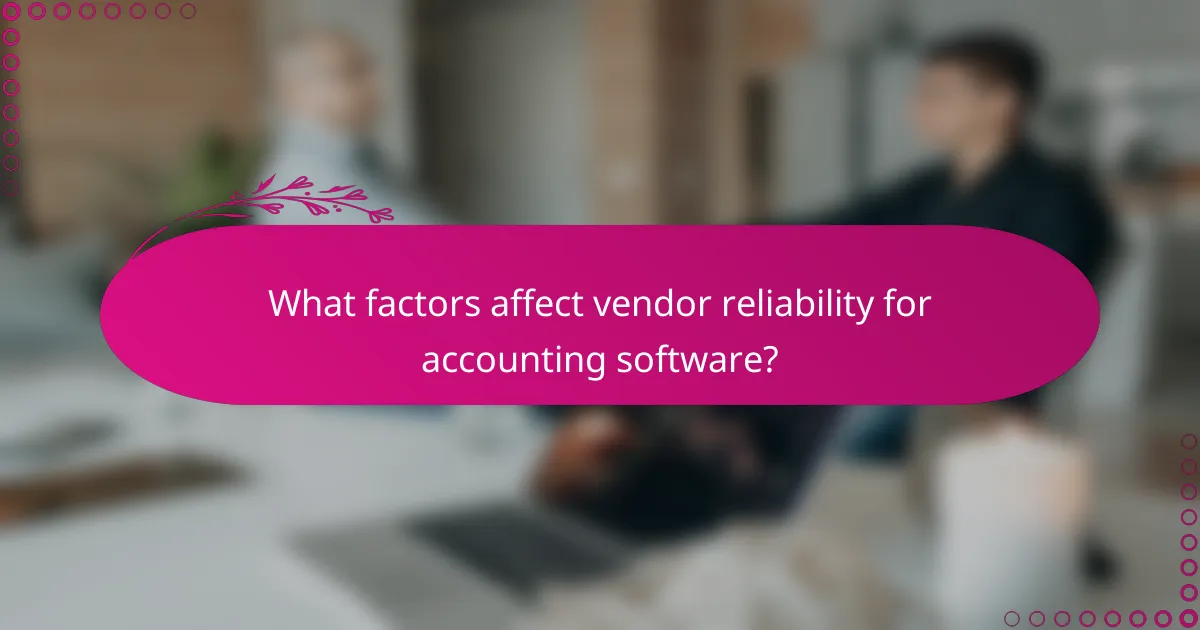
What factors affect vendor reliability for accounting software?
Vendor reliability for accounting software is influenced by several key factors, including customer reviews, service level agreements, and support responsiveness. Evaluating these aspects can help ensure that the software meets compliance requirements and maintains data accuracy.
Customer reviews
Customer reviews provide valuable insights into the reliability of accounting software vendors. Look for feedback on user experiences regarding software performance, ease of use, and overall satisfaction. High ratings and positive comments often indicate a trustworthy vendor.
Consider checking multiple review platforms to get a well-rounded view. Pay attention to any recurring issues mentioned by users, as these can signal potential risks in vendor reliability.
Service level agreements
Service level agreements (SLAs) outline the expectations and responsibilities between the vendor and the customer. A strong SLA should include uptime guarantees, response times for support requests, and penalties for non-compliance. This document is crucial for ensuring accountability.
When reviewing SLAs, look for clear definitions of what constitutes acceptable service levels. Vendors that offer comprehensive SLAs are typically more reliable, as they are committed to maintaining high standards of service.
Support responsiveness
Support responsiveness is a critical factor in vendor reliability. Quick and effective support can mitigate issues that arise during software use, ensuring that your accounting processes remain uninterrupted. Vendors should provide multiple channels for support, such as phone, email, and live chat.
Assess the average response times and availability of support teams. Vendors that offer 24/7 support or have dedicated account managers tend to be more reliable, as they can address urgent issues promptly and efficiently.
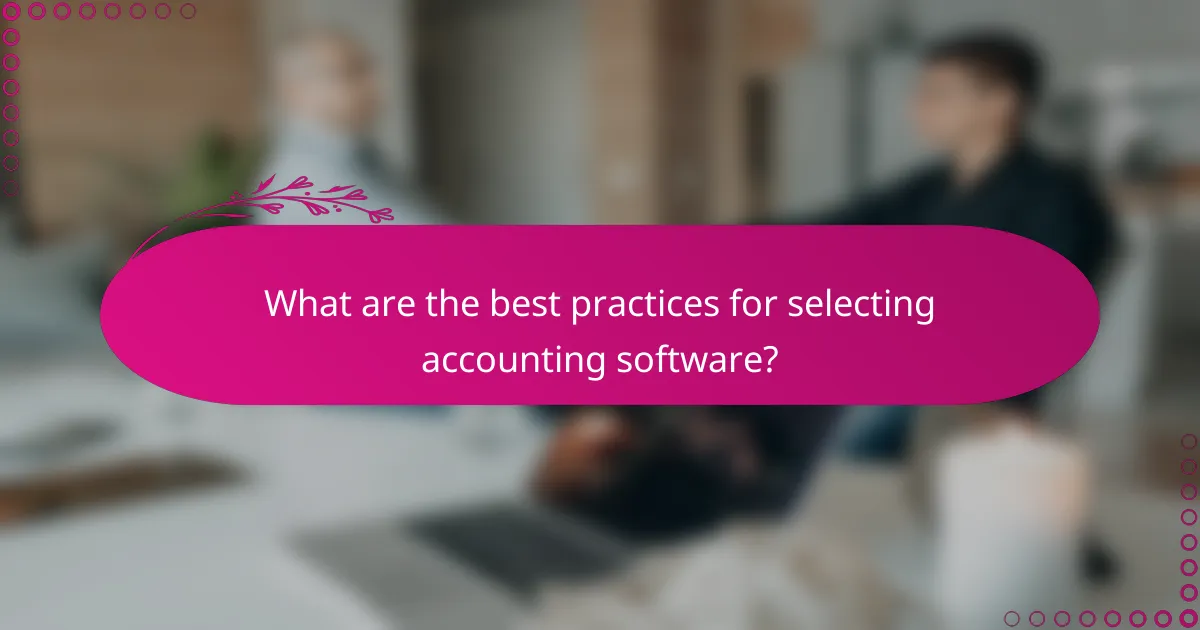
What are the best practices for selecting accounting software?
Selecting accounting software requires careful consideration of compliance features, integration capabilities, and pricing models. Prioritizing these factors ensures that the software meets regulatory standards, works well with existing systems, and fits within your budget.
Assessing compliance features
Compliance features are crucial for ensuring that your accounting software adheres to local regulations and standards. Look for software that supports tax compliance, data protection laws, and industry-specific regulations relevant to your business.
Verify that the software offers regular updates to stay compliant with changing laws. Consider tools that provide audit trails and reporting capabilities to simplify compliance checks and maintain transparency.
Evaluating integration capabilities
Integration capabilities determine how well the accounting software can work with other systems, such as CRM or ERP solutions. Choose software that easily connects with your existing tools to streamline data flow and reduce manual entry.
Check for APIs and pre-built integrations that can save time and enhance functionality. A software solution that integrates well can improve overall efficiency and data accuracy across your organization.
Comparing pricing models
Pricing models for accounting software can vary widely, including subscription-based, one-time purchase, or tiered pricing based on features. Assess your budget and determine which model aligns with your financial strategy.
Consider the total cost of ownership, including potential hidden fees for updates, support, or additional features. Evaluate whether the pricing structure allows for scalability as your business grows, ensuring that you won’t face unexpected costs down the line.
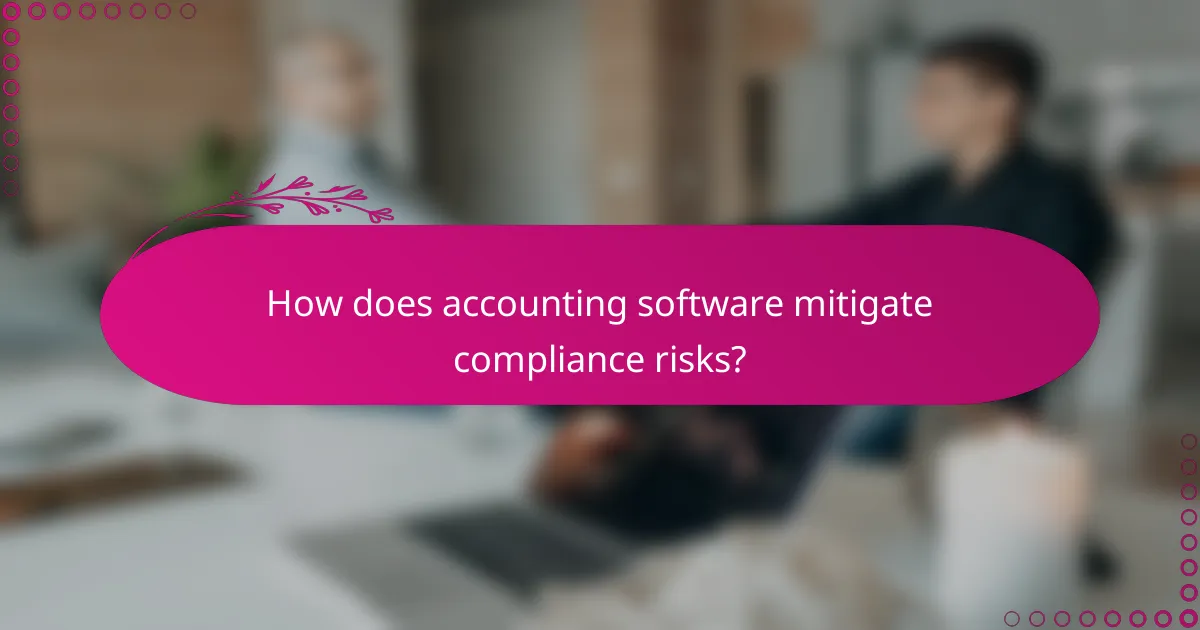
How does accounting software mitigate compliance risks?
Accounting software helps mitigate compliance risks by automating processes, ensuring adherence to regulations, and providing timely updates. This reduces the likelihood of errors and enhances the accuracy of financial reporting, which is crucial for meeting legal obligations.
Regular updates
Regular updates are essential for accounting software to stay compliant with changing regulations and standards. These updates often include new tax laws, accounting standards, and compliance requirements that affect financial reporting. Businesses should prioritize software that offers automatic updates to minimize the risk of non-compliance.
For example, software that updates quarterly can help ensure that users are always working with the latest information, reducing the risk of outdated practices that could lead to penalties.
Built-in compliance checks
Many accounting software solutions feature built-in compliance checks that automatically verify transactions against current regulations. These checks can flag potential issues before they become significant problems, allowing users to correct errors proactively. This functionality is particularly valuable in industries with stringent regulatory requirements.
For instance, software that checks for proper tax calculations or adherence to GAAP (Generally Accepted Accounting Principles) can save businesses from costly audits and fines.
Training resources for users
Providing training resources for users is crucial for maximizing the compliance capabilities of accounting software. Many vendors offer tutorials, webinars, and documentation to help users understand compliance features and best practices. This training can empower employees to utilize the software effectively and reduce the risk of human error.
Companies should consider investing in ongoing training programs to keep staff updated on new features and compliance requirements, ensuring that everyone is equipped to maintain accurate and compliant financial records.
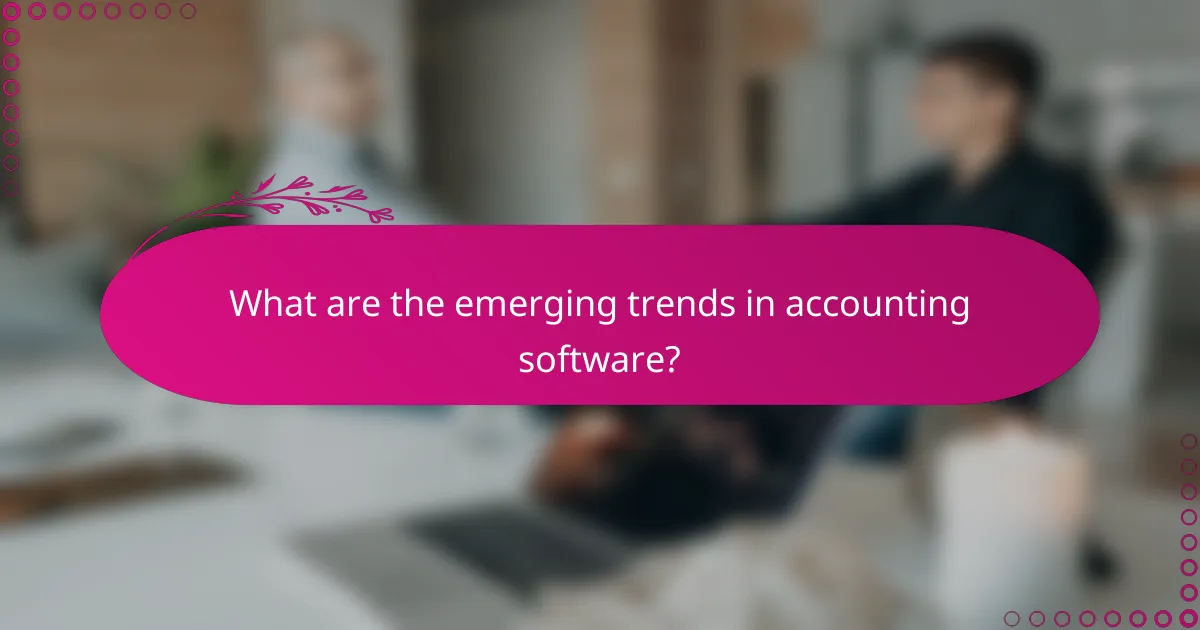
What are the emerging trends in accounting software?
Emerging trends in accounting software focus on enhancing efficiency, compliance, and data accuracy. Key developments include the integration of AI-driven analytics, cloud-based solutions, and improved vendor reliability.
AI-driven analytics
AI-driven analytics in accounting software utilizes machine learning algorithms to analyze financial data, identify patterns, and generate insights. This technology helps businesses make informed decisions by providing real-time data analysis and predictive modeling.
When considering AI-driven analytics, businesses should evaluate the software’s ability to integrate with existing systems and the quality of data inputs. Effective AI solutions can reduce manual errors and enhance data accuracy, but they require a robust data management strategy.
To maximize the benefits of AI-driven analytics, companies should invest in training staff to interpret data insights and ensure continuous monitoring of the software’s performance. Regular updates and maintenance are crucial to keep the analytics relevant and reliable.
